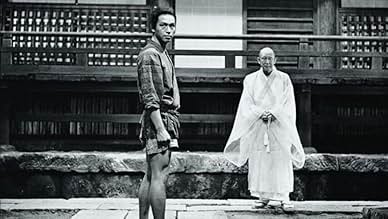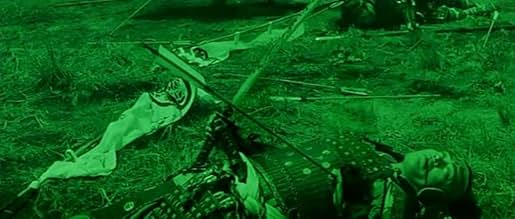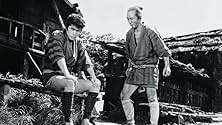Aggiungi una trama nella tua linguaA young man decides to become a warrior, causing trouble for his clan.A young man decides to become a warrior, causing trouble for his clan.A young man decides to become a warrior, causing trouble for his clan.
- Regia
- Sceneggiatura
- Star
- Premi
- 1 vittoria in totale
Kôshirô Matsumoto
- Sozo, 1st son
- (as Somegoro Ichikawa)
Kichiemon Nakamura
- Yasuzo, 2nd son
- (as Mannosuke Nakamura)
Recensioni in evidenza
Don't let the 4 star vote of one of the previous commentators prevent you from viewing this movie, it conveys much more than only a 'war is futile' message. Many 'good' war movies could be reduced to only this message (could, because mostly in reality they are only cheap propaganda a la 'Waltz with Bashir'), but certainly not this movie. As another commentator said, it lingers in your mind for a while after watching it and in this aftermath I really began to realize how meaningful and elaborate each scene or part of the story of the movie was. In one judgment sharptongue was right, though, the movie is depressing, and not only slightly. I don't want to spoil anything so let me only say that if you liked movies like 'Seven Samurai' this one is also for you.
I'm not one to usually comment on movies on IMDb, but I think the fact that the only review that shows up on the site says "Depressing" and gives it a low mark, I had to resolve that issue.
This movie is absolutely amazing. Firstly, the scope of the story is really quite amazing. We basically have six generations of one family, and their story. The story itself isn't really complex, but it really does linger in your mind for a while after watching the movie. The basic story is the how futile fighting can be. The acting is top notch, there isn't a bad performance in the lot. I thought the color effects were a little weird, and I'm not sure I understood the point of them. It didn't take away from the movie at all though.
This is an amazing film. Is it sad? Yes, it is, but that doesn't mean it shouldn't be watched. This is really a hidden gem of Japanese cinema, and I'd love to see it get a US release at some point.
This movie is absolutely amazing. Firstly, the scope of the story is really quite amazing. We basically have six generations of one family, and their story. The story itself isn't really complex, but it really does linger in your mind for a while after watching the movie. The basic story is the how futile fighting can be. The acting is top notch, there isn't a bad performance in the lot. I thought the color effects were a little weird, and I'm not sure I understood the point of them. It didn't take away from the movie at all though.
This is an amazing film. Is it sad? Yes, it is, but that doesn't mean it shouldn't be watched. This is really a hidden gem of Japanese cinema, and I'd love to see it get a US release at some point.
I have seen many Japanese films over the years and this film is one of the most breathtaking. During the film's 2 hours you are taken through generations of one family, with the film echoing the message that war leads to inevitable tragedy. The film is equally about Buddhism in the 1500s with re-incarnation, ghosts, rituals and temples being prominent to the story. In the background of the story is a grand wooden bridge that is a reminder of the dangerous world that lies across the water.
I'm a fan of the coloured on black and white visuals. It's odd but adds a strange feel to the film that matches the ancient Japan world. The battle scenes are brief but stunning. I don't think any were reused as 'WILLIAM FLANIGAN, PhD' stated in his review. That's got to be one of the worst reviews I have read. He gives points based on subtitles and restoration (which is dependent on the screening, so is useless to the reader), and not on acting, story and plot. He seems to care very little about the style and the substance of a film rather the technical aspects. Anyone who makes dodgy reviews while always signing his name in capitals with 'PhD' next to it, is a bit sad.
I'm a fan of the coloured on black and white visuals. It's odd but adds a strange feel to the film that matches the ancient Japan world. The battle scenes are brief but stunning. I don't think any were reused as 'WILLIAM FLANIGAN, PhD' stated in his review. That's got to be one of the worst reviews I have read. He gives points based on subtitles and restoration (which is dependent on the screening, so is useless to the reader), and not on acting, story and plot. He seems to care very little about the style and the substance of a film rather the technical aspects. Anyone who makes dodgy reviews while always signing his name in capitals with 'PhD' next to it, is a bit sad.
I would really love to see again this film, which I've seen in São Paulo in 1961. Besides the positive aspects mentioned by the reviews already posted, I would emphasize another quality: some events are presented two or three times from the point of view of the different characters. As the events are not organized in chronological order, and the situations, faces and happenings are similar, the film seems absolutely confusing, till you realize what is intended to be shown: the reality is repetitive, but unique for each person, and each event must be understood from different angles. It's a pity that this film is not available on DVD.
There's a rare sense of epic artistry in this unusual and striking medieval saga, directed by Keisuke Kinoshita as more of an aesthetic experience than a conventional drama. The film was designed to resemble a decorative 16th century Japanese scroll, painting spare brushstrokes of vivid color across each panoramic, wide-screen black and white image. It can be difficult (and not really worth the effort) to follow the endless progression of characters, and the manner in which the film unfolds is often more involving than the story it presents. Each leap forward in time approximates the turning of another page, usually to the next in a series of pointless, bloody battles between feudal warlords, with each conflict properly labeled beforehand, identifying the date, location, and principals involved. The battle scenes serve as punctuation, following successive generations of peasant soldiers to their doom, with the repetition suggesting that war is the only eternal aspect of the human condition, and passive resistance is futile.
Lo sapevi?
- QuizFinal film of Kuniko Igawa.
I più visti
Accedi per valutare e creare un elenco di titoli salvati per ottenere consigli personalizzati
Dettagli
- Tempo di esecuzione1 ora 57 minuti
- Colore
- Mix di suoni
- Proporzioni
- 2.35 : 1
Contribuisci a questa pagina
Suggerisci una modifica o aggiungi i contenuti mancanti

Divario superiore
By what name was Fuefukigawa (1960) officially released in Canada in English?
Rispondi





























